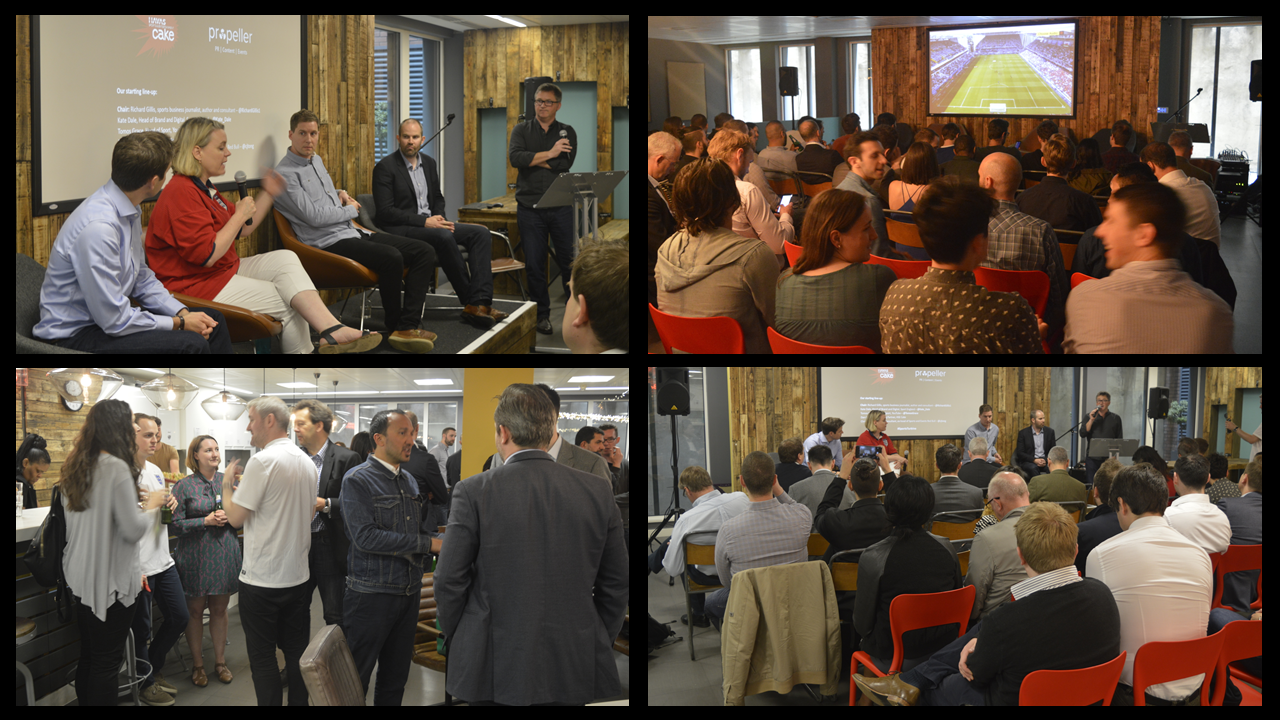
Sports marketing specialists came off the benches to debate issues around sponsorship and content at a special Propeller #SportTurbine hosted at Havas Café with HSE Cake.
The wide-ranging discussion crunch-tackled topics such as devising creative ideas with cut-through and leveraging commercial partnerships before attentions switched to watching England’s hard-fought match against Wales.
The panel featured Dan Connolly, Managing Partner of HSE Cake, Kate Dale, Head of Brand & Digital at Sport England, Tomas Grace, Head of UK Sport at YouTube and Chris Tong, consultant and former Head of Sport at Red Bull. It was chaired by sports journalist and author Richard Gillis.
Go Official Versus Go Your Own Way
Connolly said both strategies are valid and “the notion of official versus unofficial is irrelevant” – it is more important to identify the right audience, entertain them and add to their experience of the sport to cut through the huge amount of marketing clutter surrounding sporting events.
Brands can still miss an open goal when it comes to leveraging opportunities. Coca-Cola’s presence on the official Euro UEFA website was cited as a misstep by Tong, as after four clicks a visitor ends up on the brand’s Great Britain website where the main message writ large is ‘The Promotion Has Now Closed’. He said: “Marketing is creating conversations” and Coca-Cola had failed.
Cracking Content And Driving Distribution
Audiences are hungry for content and since the last Euros tournament the menu has widened with clips, snackable snippets and fun ideas delivered on social media by influencers like Spencer FC. Brands need to up the entertainment quotient and create content that can be passed for a number of platforms and channels. Nike was held up as a brand optimising its content with its film The Switch (now with 42m YouTube views) where the 30 second ad spot is used as a trailer for the full video on YouTube.
Content needs distribution and Google’s deal with ITV Sport for the Euros shows how online and offline can partner to provide fans with a seamless experience – a search for a Euros match report sees ITV Sports highlights served at the top of the page.
Sports Rights Mean More Than Sponsorship
Smaller sports offer a good opportunity for brands because the rights owners/organisers are likely to be more flexible and receptive to ideas. Tong said that Red Bull was a brand built on taking risks and sports governing bodies were not really inclined to taking risks. He added: “I hate the word sponsor – that’s a badging exercise and it’s dead in the water.”
Grace pointed out that smaller sports bodies were exploring their options in terms of commercial rights and building audiences that could be monetised on YouTube, for example Henley Royal Regatta and the Goodwood Festival of Speed.
Participation Not Guaranteed
Brand purpose is assuming increasing importance for marketers and sport appears a great vehicle whereby brands can ‘give back’. Plenty of brands try to use sporting ambassadors to inspire people to get involved. However, the polished settings and the high levels of athleticism on display in professional sport set expectations of an experience that cannot be matched. Dale pointed out that Sport England’s #thisgirlcan campaign focused on more realistic, attainable examples of sportspeople – athletes like Jessica Ennis-Hill are “so far away from what anyone else can do.”
A whole summer of sport lies ahead from Wimbledon to the Olympic Games. Brands, whether official sponsors or just looking to benefit by creating their own platform, need a game plan that amplifies and responds to the passions felt by the one essential component of all great tournaments, the fans.